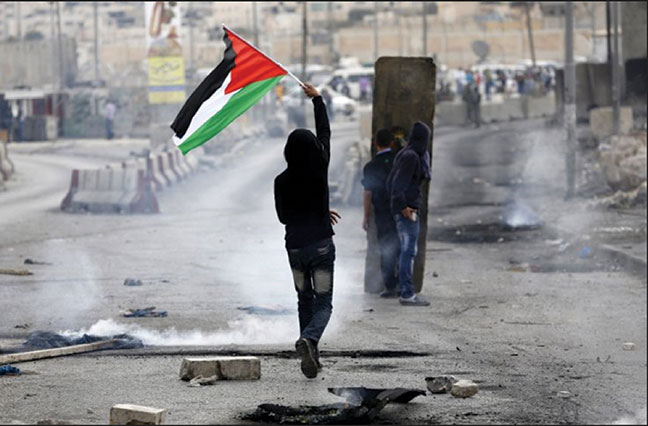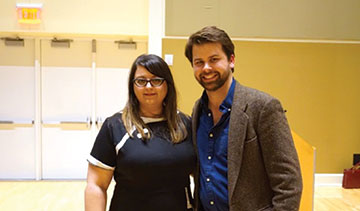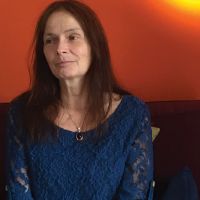
Global Reconciliation via Skype
What Discovering Global Citizenship’s Virtual Voyage initiative taught students about forgiveness.
Discouraged by stories of violence dominating world news, reconciliation scholar Michael McRay mapped a three-month journey from the contested lands of Israel and Palestine to South Africa to Northern Ireland. Along the way, he planned to collect and record stories from people who managed to transcend conflict and its tragic aftermath.
International travel and the characters and paradigms it introduces are vital, McRay said. “The stories that we tell and listen to will have a significant impact on the ways in which we imagine the world and what is possible in the world.”
TCU’s Discovering Global Citizenship program funded McRay’s trip, and in return, students traveled along vicariously. The scholar used Skype from the road to connect with classes on campus and shared blogs and social media posts, thus giving students a glimpse into a global experience witnessed from an unconventional perspective.
The “Virtual Voyage,” in addition to bringing to campus visiting scholars from outside the traditional academic speaking circuit, was at the heart of the global citizenship effort, said Jane Kucko, the initiative’s co-author who leads the university’s study-abroad department. She said the program’s design revolves around a central question: Almost 35 percent of TCU students now study abroad, but how could the university reach the other 65 percent? The answer: By connecting them to the world from where they were – on campus and in class.
Reconciliation and Literature
During McRay’s August-to-October trip, he collaborated with three TCU faculty members, including Rima Abunasser, instructor in English. Her belief in complicating dominant narratives complemented McRay’s, she said. “You have to pay attention to perspective, and you have to listen to as many stories as you can.”

Michael McRay with Rima Abunasser, Instructor of English at TCU. They share a belief in complicating narratives.
Abunasser tailored syllabi in two courses – Multiethnic Literature of the World and Global Women’s Writing – so students read works from conflict-grappling places as McRay was visiting them.
At the beginning of the multiethnic literature class, students read stories about the longstanding conflict between Israel and Palestine, including a collection of short stories by Atef Abu Saif, a Palestinian writer born in a refugee camp in the Gaza Strip.
How students perceived people who live in those foreign lands changed right away, Abunasser said. “In the first Skype session with Michael, a number of students said to him that they had never even stopped to question the idea that the Palestinians were the bad guys and the Israelis were the good guys.”
“We all have this ability to forgive if we really want that.”
Sue-Jin Green
Later, McRay invited Northern Ireland’s Jo Berry to join a Skype session with students. In 1984, an Irish revolutionary named Pat Magee killed Berry’s father, British Parliamentarian Sir Anthony Berry, with an explosive device. Today, Berry and Magee are good friends who travel the world speaking about forgiveness.

Jo Berry is an ambassador for forgiveness.
Interacting with Berry, “a normal person, not a character from a book,” and hearing her describe a valuable relationship with her father’s killer was powerful, said Sue-Jin Green of Oceanside, Calif. “We all have this ability to forgive if we really want that,” the senior writing major continued. “I think that’s the only way we can find peace within ourselves … and that’s how you eventually get peace and reconciliation on a national or global scale.”
E.Q.U.A.L.I.T.Y. at TCU
As Abunasser’s class read And They Didn’t Die, a novel by Lauretta Ngcobo about South African women opposing apartheid, McRay discussed meeting Eleanor du Plooy, an activist who facilitates discussion groups for young people as they envision a better way forward from the inequities of the past.
Du Plooy’s techniques resonated with Stanley Ford, a senior communication major from Fort Worth. In South Africa, the activist assembles kids from different races and economic backgrounds, and together they discuss “similarities, differences,” Ford said. “And then [they] can come to reconcile all the things that have happened and move towards justice.”
“You just have to meet in the middle and learn what is going to work for everybody.”
Stanley Ford
Hearing McRay describe du Plooy’s work, Ford had a revelation. “I’ve done this,” he said. “But I never thought about it as being reconciliation.”
In spring 2015, Ford was one of about 100 students who joined forces to advance race relations at TCU. People from many backgrounds and with a variety of skin shades organized a silent march. They also launched a student organization called E.Q.U.A.L.I.T.Y. and pushed for an African-American studies minor at TCU, which faculty members now are designing.
Ford said the student-led experience convinced him of the power of unified activism. It made him want to forge partnerships with people he previously considered adversaries. Building bridges between people and their conflicting ideologies is “kind of a compromise,” he said. “You just have to meet in the middle and learn what is going to work for everybody.”
Abunasser’s global literature course gave Ford confidence in pursuing a career in education or counseling because he knows he can deal with conflict of any size. “Reconciliation doesn’t have to be such a big, daunting task,” he said. “Start small, start a conversation.”

Your comments are welcome
Comments
Related reading:
Features
Discovering Global Citizenship, or How to Help a Vanishing Species
TCU’s award-winning international education program is making an impact on South Africa’s endangered rhinos.
Features
Stuart D. Flynn, M.D., Dean of Fort Worth’s New Medical School
TCU Magazine Editor Norma Martin spoke with Flynn about the evolution of medical school education and the opportunity to develop an innovative M.D. school in the 21st century.